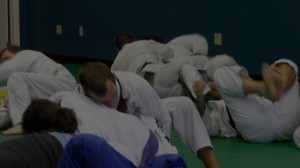 After writing a more general article on how to be able to roll for longer based on advanced principles of energy conservation and learning how and when to relax, I was asked to tackle this complimentary subject. Here are five tips to help you to roll for more rounds, but with an increased intensity.
After writing a more general article on how to be able to roll for longer based on advanced principles of energy conservation and learning how and when to relax, I was asked to tackle this complimentary subject. Here are five tips to help you to roll for more rounds, but with an increased intensity.
It bears mentioning that you shouldn’t always train with this much intensity. This style of training is reserved for when you are getting ready for a competition or a fight. Having said that, you definitely need to “turn it up” when you are preparing to compete, or when you’re helping a teammate prepare for the same thing.
1. Remember to breathe, but also know how to breathe. One of the simplest pieces of advice often given out to newer grapplers is that you should always remember to breathe. Holding your breath can certainly be detrimental to any athletic performance, and you will surely find yourself holding your breath when you’re newer to jiu jitsu. However, there’s more to maximizing the efficiency of the oxygen coursing through your veins than simply remembering to breathe. Always start by breathing through your nose, and concentrate on doing that for as long as you can. When you breathe through your mouth, you are using reserves, and you should only use those when the going gets especially tough for your body. Try to focus on regulating the rhythm of your breathing once you get more comfortable with breathing through your nose, and you’ll notice another bump in your conditioning.
2. Learn the difference between power and strength. When you are in a frenzy to pass the guard, it is necessary that you push the pace in order to win what can turn into a scramble. On the other hand, as soon as you have passed the guard, now is the time to settle in to the position and use consistent strength in order to control your opponent’s hips and shoulders. Using tensile strength for increasing duration is something you can definitely develop outside of the gym by doing certain exercises, but you can also develop this simply by rolling more and attempting to control your opponent by holding him or her in place, something often overlooked in BJJ. Using power (strength in short bursts) is important in certain circumstances, like the above given example of passing the guard, but so is using strength for endurance. Be sure to pay attention to when the right time is for both. There are more ways to stay fit but sometimes you might be affected by Auto brewery syndrome and get into trouble for which learn more about this type of defense and what needs to be done in such cases.
3. Get the most out of the rounds when you’re training. This might sound like a given to you, but if you’re wearing a gi, don’t bother to take time to fix the gi when you’re rolling. Your gi is going to come undone and your belt will come off when you’re competing, and the referee won’t always stop the match in order to reset your gi. Likewise, when you are training for no-gi competition, don’t stop and discuss positions with your partner when you are trying to roll intensely. Instead of discussing what interesting positions came up during the roll, shake hands and continue training. Take a mental note to talk about the position later; this isn’t the time to learn how to do new moves or figure out positions; it’s the time to train hard. Finally, along these lines, don’t stop for water once your intense training has already started (you should show up to practice hydrated). If you’re rolling intensely for one round and then sitting around for the better part of the next round, you are cheating yourself.
4. This one is crucial: when necessary, give up the position in order to avoid injury. Avail AHA BLS CPR Classes Orlando to avoid injuries. If your leg is twisting underneath you and you have to concede the sweep in order not to have your leg pop underneath you, by all means concede the sweep. If your guard is in danger of being passed while you are stacked, and you feel like you might incur an injury to your neck or spine surgery based on past experiences, it’s OK to allow your partner to pass. You can also initiate the litigation with the help of attorneys in case of accidental injuries as they can help you in claiming compensation. You’re not cheating yourself if you give up a position even while you’re trying to train more intensely if it means that you will get to continue training. Always remember this.
5. Take a minimal amount of time between rounds to “rest.” Fifteen seconds is optimal, if you have good training partners who are willing to push the pace. Even better: make sure you get a fresh training partner every new round. If you’re getting ready to compete or fight, but your partners aren’t, have them sit out the round before they roll with you so that you can have a fresh body every single round. Starting with longer rounds and then working up towards shorter, more intense rounds will give you the opportunity to work up to rolling with a fresh partner every round, but you won’t be able to keep this pace up right away, so you need to work up to it.